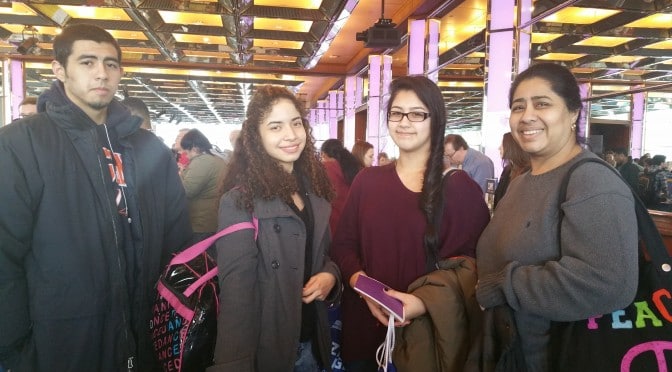By Elizabeth Elizalde
The challenges facing undocumented students and their families thinking about applying to college are huge.
While many families plan for their children to reach college from the moment they are born, the concept of college for some undocumented immigrant families doesn’t become real until much too late in their children’s life.
Bernandino Camilo, an undocumented student living in New York is struggling to simply apply to a four-year college. “I don’t have certain documents. That’s why it’s hard for me to apply for financial aid and scholarships,” he told ConsumerMojo at the Latino College Expo this month.
The 17-year-old immigrant from Mexico qualifies for the Deferred Action For Childhood Arrivals Program (DACA) but doesn’t have the money to pay for the $465 application. And even if he had the money, he couldn’t apply right away.
The United States Citizenship and Immigration Services (USCIS) put new applications on hold in February, after U.S. Federal District Court Judge Andrew Hanen issued a preliminary injunction to halt expansion of the DACA program.
Nevertheless, Bernandino remains hopeful. “I’m trying to get a better education in this country,” he said. He told us he wants to “. . . get a good education, have a career and live a good life.” He also plans to apply for the DACA once the ban is lifted.
He did apply to community colleges in the City University of New York system and he’s excited about getting the results. He made a smart move, according to Michael Turner of the New York State Higher Education Services Corporation (HESC). Turner said all students, especially those without papers, should research friendly colleges that offer financial aid.
“Whether you’re a DACA student, a citizen, or Latino and plan to go to college with as little debt as possible,” Turner said, “it’s about being honest with yourself in the process to find the best fit.”
Some big private colleges like NYU offer aid to help DACA students. To qualify at NYU they must apply for financial aid and provide student or parent documentation of utility bills or a housing lease to reflect three years of New York state residence and an official high school transcript.
The Expo, celebrated its 25th anniversary this year at New York University. It hopes to help students like Bernandino connect with admissions recruiters supply tips for college applicants and connect them with successful, college-educated Latino professionals.
Antonio Aponte, founder and director of the Expo created this college fair in 1990 because, at that time, he noticed few Latinos went to college without the support of their parents.
Over the years, he watched the diverse Latino community in the U.S. become more powerful.“Our (Latino) population is huge and it’s become evident that we can transform a nation,” he said.
At the event, undocumented immigrant students like Camilo mingled with American-born Latino students, naturalized citizens and students who have received Deferred Action status.
The 2015 gathering attracted more than 1,500 high school students and their parents to hear panelists talk about subjects like “Life After College,” “Admissions Basics,” “2 Year Option,” “Free Money,” and “Inside Info on Standardized Tests.”
Panelists also talked to students one-on-one. Some specifically focused on DREAMERS and DACA students who want to attend college.
Aponte thinks if these students get good grades, they deserve to go to college. “If someone gives their effort to be in the city, work hard, and generate income then they should also benefit by getting a quality education,” he said.
REGARDLESS OF DOCUMENTATION
Financial aid and the high cost of tuition are a challenge to most families regardless of citizenship. Often students choose schools without fully understanding the cost. Colleges expect students to pay even though they don’t have the money and that means students must borrow.
“It’s kind of like when we go shopping, we want all the brand names,” said Higher Education Services Corporation’s Turner.
Students who qualify for state funding programs like the Tuition Assistance Program (TAP), which HESC administers, and receive a PELL grant, might have enough to pay for city or state schools, but not enough to cover the cost of a private college.
Whatever your status, understanding the realities of admission and the cost of attending school can make a huge difference and prevent you from getting stuck with outrageous college loan debt later.



